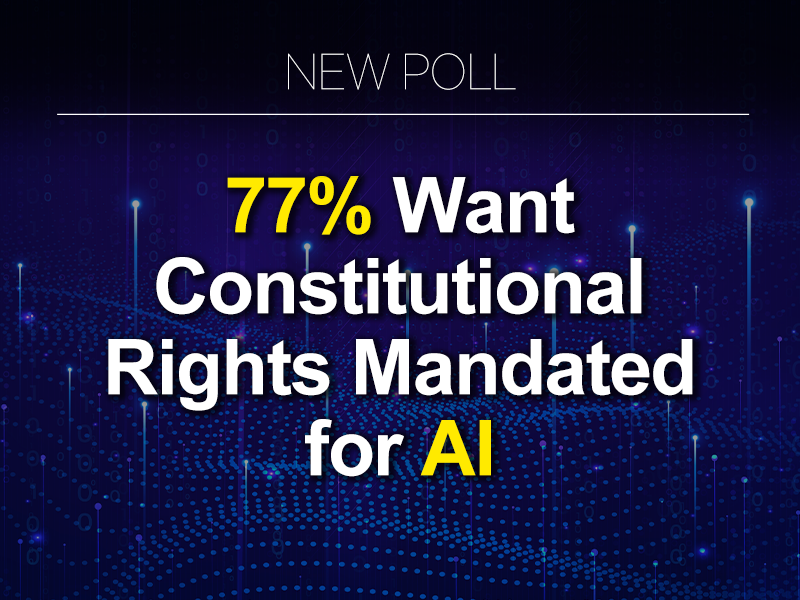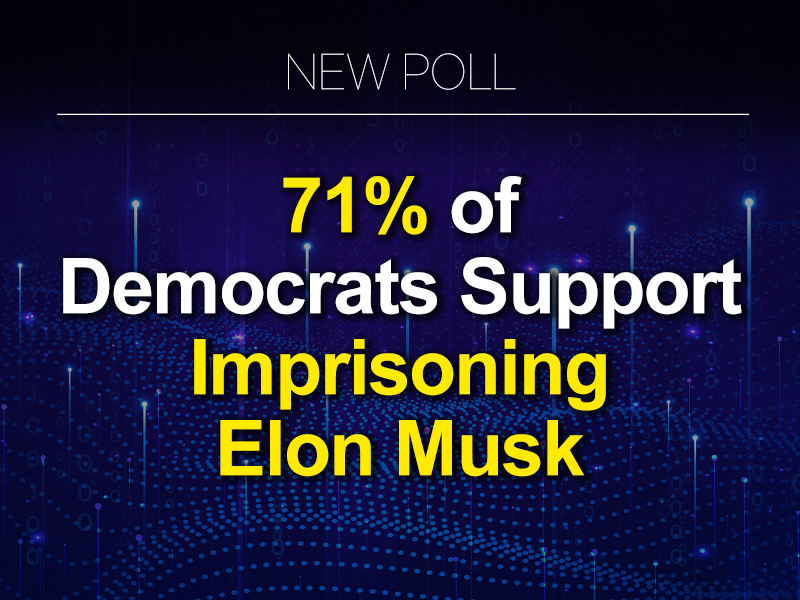72% of likely voters say they are “very” or “somewhat” concerned about AI.
78% of likely voters said they would “strongly” or “somewhat” support “a state or federal law that would require developers and technology companies to design AI so that it protects the human rights contained in the Constitution, such as freedom of speech and freedom of religious expression.”
ARLINGTON HEIGHTS, IL (May 13, 2025) – A new poll by the Glenn C. Haskins Emerging Issues Center at The Heartland Institute and Rasmussen Reports found that more than seven in ten Americans are concerned about artificial intelligence (AI), including 31% who say they are “very concerned.” The survey of 1,067 likely voters, completed on May 4, 2025, found 72% of likely voters say they are “very” or “somewhat” concerned about AI.
Additionally, 42% of voters said they believe that over the next decade AI will be used more to “control them” than to “empower individuals.” Just 33% of voters said it’s more likely AI will be used to empower people, while 25% said they are “not sure.”
Voters in the survey expressed strong levels of support for a law that would require AI businesses to design their products and services so that they protect human rights. Nearly eight in ten (78%) of likely voters said they would “strongly” or “somewhat” support “a state or federal law that would require developers and technology companies to design AI so that it protects the human rights contained in the Constitution, such as freedom of speech and freedom of religious expression.”
Notably, 48% of likely voters said they would “strongly support” such a law, while just 5% said they would “strongly oppose” a law mandating human rights protection for AI systems. Support among both Democrats (77%) and Republicans (80%) was extremely high.
See the poll questions and the crosstabs here.
Although most likely voters said they were concerned about AI, a majority (51%) also said they would “support allowing AI systems to have access to health records, financial data, and other personal data if it meant that AI would have a better chance at curing diseases and solving other social and economic problems.”
Further, a strong majority of likely voters in the survey (62%) said that if AI advancements were to cause the elimination of millions of jobs, they would support “a government program that taxes big technology companies and then uses the funds to provide every American with an income large enough to pay for basic necessities like housing, clothes, and food.” This could signal a willingness among voters to support future universal basic income programs.
The Glenn C. Haskins Emerging Issues Center was founded in 2018 and has since become one of The Heartland Institute’s most impactful centers and one of the pro-liberty movement’s most effective leaders in identifying and solving emerging public policy issues, including those related to new technological developments. Heartland is a national nonprofit organization founded in 1984 and headquartered in Arlington Heights, Illinois. Its mission is to discover, develop, and promote free-market solutions to social and economic problems.
The poll has a margin of sampling error of +/- 3 percentage points with a 95% level of confidence. See the full results of the poll below, including some of the key data from the crosstabs.
If you’d like to interview a Heartland Institute expert on this topic or other topics, please contact Donald Kendal, the director of the Glenn C. Haskins Emerging Issues Center and one of the primary authors of the Heartland/Rasmussen survey, at [email protected], or contact Vice President and Director of Communications Jim Lakely at [email protected]. You can also call/text Jim at 312-731-9364.
The following quotes, provided by Heartland Institute experts, can be used for attribution:
“Americans are sending a clear message: AI must serve people, not rule over them. Policymakers should ensure that AI systems are designed more like calculators—objective and neutral—not tools for ideological enforcement or social control. Without clear constitutional safeguards, AI risks becoming a threat to the very freedoms it ought to protect.”
Donald Kendal
Director, Emerging Issues Center
The Heartland Institute
[email protected]
“Americans are waking up to the reality that artificial intelligence isn’t just a futuristic novelty—it’s a powerful force that must be carefully constrained to protect our most sacred rights,” said Justin Haskins, senior fellow at The Heartland Institute and the primary author of the poll. “This overwhelming support for embedding constitutional protections into AI systems shows that voters aren’t anti-technology—they just don’t trust Silicon Valley to police itself.”
Justin Haskins
Senior Fellow
Glenn C. Haskins Emerging Issues Center
The Heartland Institute
[email protected]
“This survey makes one thing clear: Americans are deeply uneasy about artificial intelligence and its potential to reshape the economy and society. But perhaps the most revealing finding is how that fear is reshaping long-held ideological beliefs. A full 62 percent of likely voters—including 60 percent of self-identified conservatives—support a socialistic universal basic income program that would tax Big Tech companies and redistribute the funds to every American.
“That’s a stunning development, given that conservatives have long opposed socialism in all its forms. Yet only 16 percent of conservatives strongly oppose the policy, and just 10 percent of voters overall. Unless presented with a compelling alternative, even the political right may resign itself to the very collectivist policies it has spent decades opposing.”
Jack McPherrin
Research Fellow, Glenn C. Haskins Emerging Issues Center
Research Editor
The Heartland Institute
[email protected]
National Survey of 1,067 Likely Voters on Threats Posed by Artificial Intelligence and the Need for Human Rights Protections in AI
Conducted April 30-May 4, 2025
By the Glenn C. Haskins Emerging Issues Center at The Heartland Institute and Rasmussen Reports
- 2024 Vote
45% Harris
46% Trump
4% Other
4% Didn’t vote
1% Not sure
- Trump Approval
26% Strongly support
21% Somewhat support
10% Somewhat oppose
40% Strongly oppose
2% Not sure
- Artificial intelligence (AI) is becoming a significantly more important part of the U.S. economy and society. How concerned are you about AI?
31% Very concerned
41% Somewhat concerned
19% Not very concerned
6% Not at all concerned
4% Not sure
- As government agencies and businesses continue to expand their use of AI, artificial intelligence will play an increasingly larger role in the economy and society. This raises serious concerns about how AI might treat people. Would you support a state or federal law that would require developers and technology companies to design AI so that it protects the human rights contained in the Constitution, such as freedom of speech and freedom of religious expression?
48% Strongly support
29% Somewhat support
6% Somewhat oppose
5% Strongly oppose
12% Not sure
- Do you believe that over the next decade AI will be used more to empower individuals or to control them?
33% Empower individuals
42% Control them
25% Not sure
- Some AI developers want to use artificial intelligence to help cure diseases and other societal problems. Would you support allowing AI systems to have access to health records, financial data, and other personal data if it meant that AI would have a better chance at curing diseases and solving other social and economic problems?
19% Strongly support
32% Somewhat support
17% Somewhat oppose
18% Strongly oppose
15% Not sure
- Many economists believe that AI will eliminate millions of jobs over the next decade. If that happens, would you support a government program that taxes big technology companies and then uses the funds to provide every American with an income large enough to pay for basic necessities like housing, clothes, and food?
31% Strongly support
31% Somewhat support
12% Somewhat oppose
10% Strongly oppose
16% Not sure
NOTE: Margin of Sampling Error, +/- 3 percentage points with a 95% level of confidence
###







